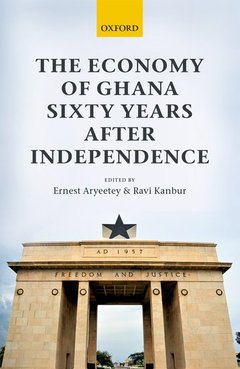The Economy of Ghana Sixty Years after Independence
Langue : Anglais
Coordonnateurs : Aryeetey Ernest, Kanbur Ravi

As Ghana approaches its 60th birthday, optimism and worries for the future continue to be present in equal measure. Economic growth in the last decade has been high by historical standards. Indeed, recent rebasing of GDP figures has put Ghana over the per capita income threshold into Middle Income Country status. However, structural transformation has lagged behind. Fiscal discipline has also eroded significantly and there is heavy borrowing, especially on the commercial market, while elements of the natural resource curse from oil have already occurred. The question most observers ask is whether the gains from two decades of reforms are being reversed. Given this background, this volume brings together leading established and young economists, from within and outside Ghana, to analyze and assess the challenges facing Ghana's economy as it enters its seventh decade and the nation heads towards three quarters of a century of independence. The chapters cover the major macroeconomic and sectoral issues, including fiscal and monetary policy, trade and industrialization, agriculture and infrastructure. The volume also covers a full range of social issues including poverty and inequality, education, health, gender, and social protection. The book also examines the implications of the oil boom for Ghanaian development, and the role of institutions.
Prior to his appointment as Vice Chancellor Ernest Aryeetey was a Senior Fellow and Director of the Africa Growth Initiative at the Brookings Institution. He was also Director of the Institute of Statistical, Social and Economic Research (ISSER) of University of Ghana, Legon. His research focuses on the economics of development with interest in institutions and their role in development, regional integration, economic reforms, financial systems in support of development and small enterprise development. He is well known for his work on informal finance and microfinance in Africa. He is a member of the Governing Council of United Nations University, Tokyo. He has published with leading development journals and publishers and he is a co-editor of The Oxford Companion to the Economics of Africa (OUP, 2012). Ravi Kanbur is well known for his role in policy analysis and engagement in international development. He has served on the senior staff of the World Bank including as Chief Economist for Africa. He is also ranked in the top 0.5% of academic economists in the world. He is President-Elect of the Human Development and Capabilities Association, Past-President of the Society for the Study of Economic Inequality, Chair of the Board of UNU-WIDER, Co-Chair of the Scientific Council of the International Panel on Social Progress, member of the OECD High Level Expert Group on the Measurement of Economic Performance, and a member of the Core Group of the Commission on Global Poverty.
Date de parution : 02-2017
Ouvrage de 436 p.
16.7x24.1 cm
Thèmes de The Economy of Ghana Sixty Years after Independence :
© 2024 LAVOISIER S.A.S.



